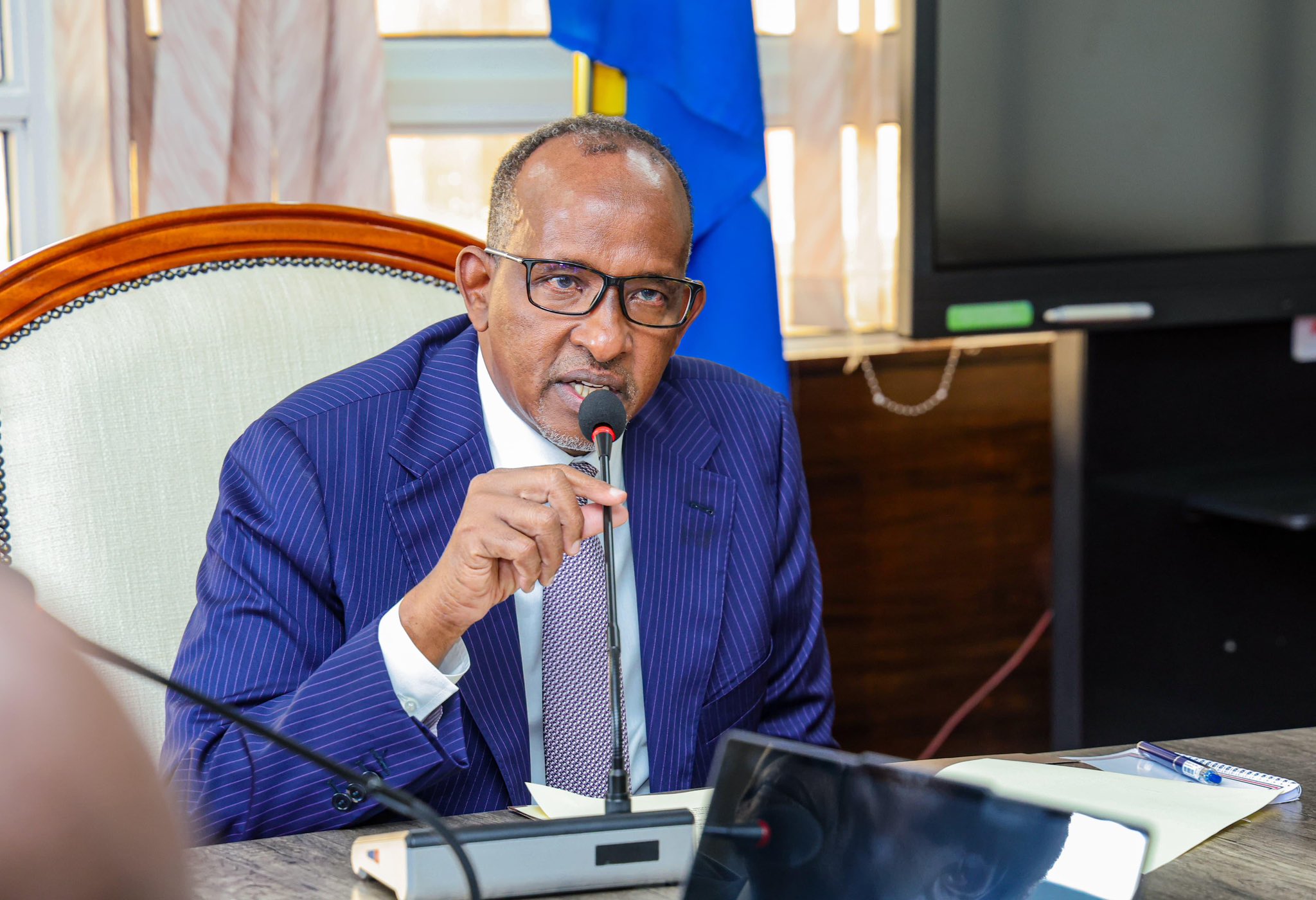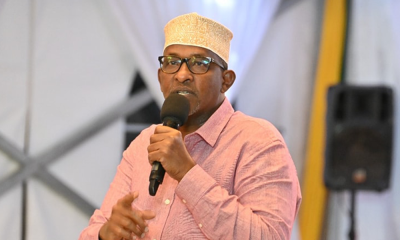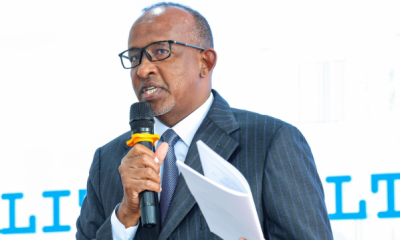News
Duale Approves Billions for SHA Tycoons Despite System’s Technical Flaws
Under the contract’s payment structure, the monthly disbursements will progressively increase from Sh500 million to a peak of Sh1.065 billion between 2028 and 2032 – representing one of the most lucrative government contracts in Kenya’s history.

As millions of Kenyans struggle with a dysfunctional healthcare system, a well-connected consortium led by Safaricom PLC is set to pocket a staggering Sh104.8 billion from a hastily approved digital health platform that remains largely non-functional months after its scheduled launch.
Fast-Tracked Deal, Slow-Motion Implementation
Documents reveal that the proposal to develop the Integrated Healthcare Information Technology System (IHTS) for the Social Health Authority (SHA) received unprecedented approval speed.
The Safaricom-led consortium, which includes Konvergenz Network Solutions and UAE’s Apeiro Ltd, submitted their proposal on May 15, 2024 and received notification of the award just one day later on May 16 – an extraordinary timeline for a multibillion-shilling government contract requiring multiple agency approvals.
Despite Health Cabinet Secretary Aden Duale’s recent assertions that the system is “working seamlessly,” multiple reports confirm that implementation is significantly behind schedule.
While the consortium was expected to begin receiving monthly payments of Sh500 million starting February 2025, CS Duale admitted this week that “no money has been paid” – an indirect acknowledgment that the system has failed to meet contractual milestones.
Regulations Pave Way for Payments Despite Problems
In what appears to be a move to accelerate payments, CS Duale gazetted digital health regulations on April 9 that establish the legal framework for reimbursing the consortium.
These regulations were pushed through despite an ongoing court case filed by Busia Senator Okiya Omtatah challenging the legality of both the contract and the SHA itself.
“The newly gazetted regulations might trigger payments before milestones are achieved,” warned a source close to the project who spoke on condition of anonymity.
Under the contract’s payment structure, the monthly disbursements will progressively increase from Sh500 million to a peak of Sh1.065 billion between 2028 and 2032 – representing one of the most lucrative government contracts in Kenya’s history.
Patients Bearing the Brunt
While the consortium stands to reap billions, ordinary Kenyans face a healthcare system in crisis.
According to recent reports, patients are being subjected to double SHA deductions from their salaries while simultaneously being forced to make out-of-pocket payments at healthcare facilities due to system failures.
“I’ve been deducted 2.75% of my salary for SHA, but when I went to the hospital last week, their system was down,” James Kimani, a civil servant in Nairobi told reporters. “They told me to pay cash or go elsewhere. What exactly am I contributing towards?”
The situation is particularly dire for the majority of Kenyans in the informal sector.
While formal employees have no choice but to contribute through payroll deductions, reports indicate that only 3.5 million salaried Kenyans are currently carrying the entire financial burden of the system, with the informal sector – accounting for 80 percent of Kenya’s workforce – largely defaulting on payments.
Complex Corporate Structure Raises Questions
Behind the lucrative deal stands a web of recently incorporated companies with connections to powerful interests.
Apeiro Ltd, registered in the UAE, is ultimately linked to International Holding Company (IHC), a massive investment firm with substantial ownership by the UAE royal family.
Locally, Konvergenz Network Solutions’ ownership structure includes several recently formed entities and prominent lawyers, raising questions about potential conflicts of interest and political connections that may have facilitated the rapid approval process.
The contract includes generous protections for the consortium, including clauses addressing currency fluctuations, tax changes, and inflation – effectively insulating them from financial risks while the Kenyan taxpayer bears the burden of implementation failures.
System Plagued by Technical Issues
Healthcare providers have reported numerous challenges with the SHA system, with many facilities reverting to manual claims processing due to persistent glitches.
A transition team flagged significant gaps in the claims database, while more than half of private hospitals had not successfully transitioned to the SHA system as of early October 2024.
The initial investment for the software and infrastructure is set at Sh34 billion, with the consortium expected to have the system fully functional by August 2026.
However, industry experts question why Kenyans are being forced to contribute to a system that remains largely aspirational rather than operational.
As the legal challenge to the contract continues in court, Kenyans remain caught between mandatory contributions to a system that doesn’t work and the increasing cost of healthcare.
Meanwhile, the regulatory framework established by CS Duale ensures the consortium will soon begin receiving their billions – functional system or not.
Under the contract signed on August 9, 2024, the consortium was set to receive Sh500 million monthly starting February 2025.
While the procurement and contract signing was between the Ministry of Health and the consortium, the works coming out of the deal fall under the mandate of the Digital Health Agency (DHA).
Starting 2026, the monthly payments were to increase to Sh650 million, and then to Sh900 million in 2027. Between 2028 and 2032, the monthly payments were to hit Sh1.065 billion.
In 2033, the monthly payments would go down to Sh1 billion. Between January and April, 2034 they would drop to Sh900 million. In May, 2034 the Safaricom consortium would receive Sh708.1 million before getting a final Sh500 million installment the following month.
Those payments are pegged on completion and implantation of certain software and physical infrastructure.
Under the contract, the consortium was expected to have the system up and running within the first two years after signing. That means that by August, 2026 the system is intended to be working
The initial investment in the software and necessary infrastructure is set at Sh34 billion.
For ordinary citizens like Kimani, the promise of universal healthcare feels increasingly distant: “They’re quick to take our money but slow to deliver services. While we suffer, someone is getting rich off this chaos.”
Kenya Insights allows guest blogging, if you want to be published on Kenya’s most authoritative and accurate blog, have an expose, news TIPS, story angles, human interest stories, drop us an email on [email protected] or via Telegram
-

 Grapevine4 days ago
Grapevine4 days agoAlleged Male Lover Claims His Life Is in Danger, Leaks Screenshots and Private Videos Linking SportPesa CEO Ronald Karauri
-

 Lifestyle1 week ago
Lifestyle1 week agoThe General’s Fall: From Barracks To Bankruptcy As Illness Ravages Karangi’s Memory And Empire
-

 Americas2 weeks ago
Americas2 weeks agoEpstein Files: Bill Clinton and George Bush Accused Of Raping A Boy In A Yacht Of ‘Ritualistic Sacrifice’
-

 Business2 weeks ago
Business2 weeks agoCooking Fuel Firm Koko Collapses After Govt Blocks Sh23bn Carbon Deal
-

 Business2 weeks ago
Business2 weeks agoABSA BANK IN CRISIS: How Internal Rot and Client Betrayals Have Exposed Kenya’s Banking Giant
-

 Investigations1 week ago
Investigations1 week agoEpstein Files: Sultan bin Sulayem Bragged on His Closeness to President Uhuru Then His Firm DP World Controversially Won Port Construction in Kenya, Tanzania
-

 News2 weeks ago
News2 weeks agoAUDIT EXPOSES INEQUALITY IN STAREHE SCHOOLS: PARENTS BLED DRY AS FEES HIT Sh300,000 AGAINST Sh67,244 CAP
-

 Business1 week ago
Business1 week agoKRA Can Now Tax Unexplained Bank Deposits


























